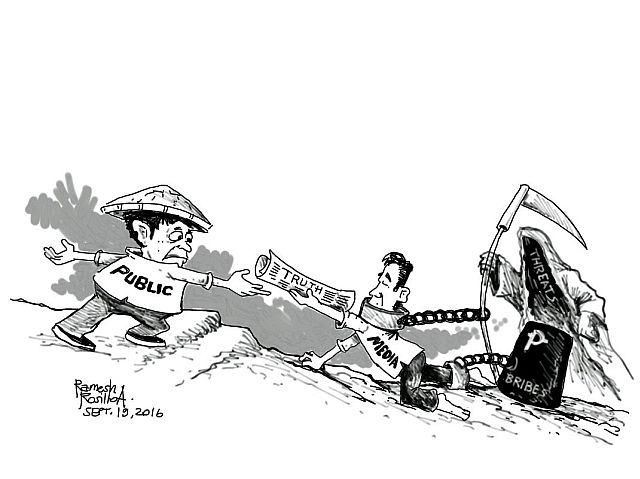Journalism is probably one of the few human endeavors where the greatest challenge to a practitioner is not a test of skills. In most professions, it is often this test of skills that makes or breaks a career. Not so with journalism. In this profession of serving as mirror to society, it is credibility that mainly measures a journalist to the very last ounce of his/her true worth.
Journalism is not an exact science. In the daily struggle to mirror society — i.e., to report the truth — human limitations are bound to cause some problems. But these are not without remedies that are equally immediate and substantive. If errors are discovered, in either grammar or fact, these are edited out or corrected in the shortest time afterward, much like cleaning a real mirror and repositioning it to get rid of blurry images and warped reflections.
In most cases, the public can be quite forgiving over patently unintended lapses, and credibility remains largely unsullied and intact. But sometimes, there are instances when journalists and even entire news organizations cross the line between reporting fact and reporting what they imagine fact to be. Worse, stepping out of bounds is sometimes not only deliberate on its face, it also seems laced with motive and malice.
One foreign news organization that fancies itself as the global news leader has lent itself to the candidacy of one against another in an upcoming election that its name has been given an entirely different meaning in the country of its origin. Clearly, this news organization has one huge credibility problem to deal with after the election. But if you think its credibility problem is its own, think again.
Any credibility problem involving one member of the media has a way of infecting the rest of the media. It is a kind of sectoral phenomenon that perhaps only sociologists can explain. But in the same manner that one bad cop makes all other cops look bad, so does one journalist or one news organization falling into disrepute make the entire media universe seem disreputable.
In a manner of speaking, it is very ironic that a sector that makes it its calling to mirror the truth about society does not really know what that society is saying behind its back, and it is only to its credit that the balm of a clear conscience still works to assuage any doubts about its individual and collective sense of credibility.
To come to the point, the media can be its very own worst enemy if it does not guard its values zealously. And that is why credibility is guarded like a heavenly treasure by every journalist who values his/her name and by every news organization that puts a premium on its reputation. But that is no longer as easy to do as just saying it. Times have changed. Even values probably have too.
The challenges facing media and every media practitioner have become more than just a balancing act between credibility and losing it. It is the very act of surviving itself. There was a time when technology used to be viewed as a boon to everyone who embraced its benefits. Technology allowed people to do things faster and cleaner and more at the least time. It opened up possibilities nobody thought were even possible before.
But technology introduced dangerous pitfalls as well: dangers that, if not guarded well, can threaten journalism where it matters the most — its credibility. The biggest assurance for credibility in traditional media is its verifiability. You know the journalists in your neighborhood and the media outlets they work for and represent. And even when traditional media eventually embraced technology and went online, they were still verifiable.
But cyberspace is almost limitless in scope and availability. Where before huge amounts of capital went into media production, today anybody with a cell phone or similar device can be a dispenser of news or information by a wide variety of means — tweets, posts, e-mails, even pictures and videos. There is an entire universe of sources out there that, by sheer volume, makes them impossible to track and subject to the same verifiability that makes traditional media accountable.
This is not to say that cyberspace and social media are unreliable. Far from it. The fact alone that traditional media have taken to cyberspace and social media is a validation of everything positive about this new platform. Still, all things being equal, not everything in this new environment is positive. There are, in fact, sources in cyberspace that are not only unreliable, they are malicious and created mainly to sow misinformation and to deceive.
Sadly, they cannot be isolated to their own esoteric formats or platforms to suffer what there is to suffer when credibility flies out the window. As specialized as they are in their own cyber world, they can and will infect all other mediums, including traditional media, which will probably not know what hit them. And if something hurts most to traditional media, it is to have its credibility doubted, for no stronger reason than one bad egg renders all other eggs suspect.
This Press Freedom week, the media in Cebu would like to appeal to its public for greater understanding. The men and women who work night and day, rain or shine, to bring you what you need to know about your community and your world, are not the perfect personalities they sometimes appear to be. That perception is just the sheen from a profession that is as noble as it is plain. We take pride in our work and value credibility more than anything else. We hurt too when we mess up.
Disclaimer: The comments uploaded on this site do not necessarily represent or reflect the views of management and owner of Cebudailynews. We reserve the right to exclude comments that we deem to be inconsistent with our editorial standards.

